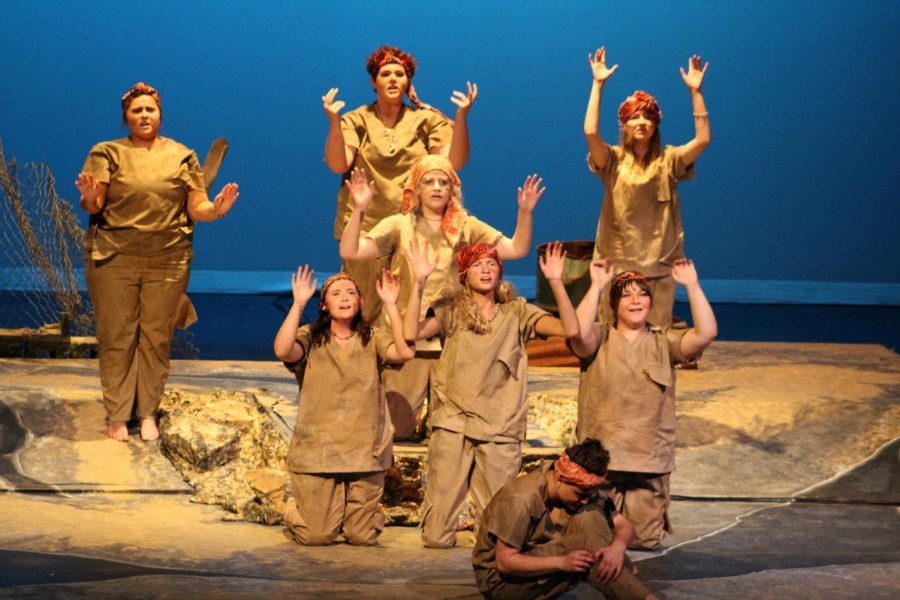After Months of Pandemic Related Setbacks, “Trojan Women” Stuns with Tragic Elegance
The cast of Trojan Women juxtaposed the death of the men of Troy to police brutality with tragic elegance/ Photo // Savanah Richards
September 25, 2020
After a rocky end to the 2019-20 season due to COVID-19, the Piedmont Players put on a heart wrenching production of “Trojan Women.” The straight play, which you might not feel like you should morally clap for when the lights black out after the 80 minute show, was as emotionally draining as the end of “The Iliad,” which it was written to reflect.
The play opened with a group of Trojan women scattered along the floor weeping and grieving for the city of Troy which was being destroyed by the Greecians in the Trojan War. Hecuba, played by Cheyenne Welborn, spoke of the destruction of the city. Throughout the play, the women went back and forth about what was happening and how it was impacting them as they were preparing to be sent to separate Greecian kings as slaves.
After recasting several of the cast members who graduated in the Spring, the Players put on “Trojan Women” in five weeks. Mia Clegg, the most pivotal change in casting, was an intense and well-fitted addition. She conveyed the emotions of a grieving mother and wife with passion not overlooked by the Roar.
“Trojan Women” presents the audience with a small glimpse into the depressing and melodramatic realities of the fall of Troy. Although the play is set in ancient times, this modern adaptation showed what a fallen America might be. Director, Bill Gabelhausen, and Assistant Director, Brittany Wilder (who took over for now alumna Taylor Pope) did this very intentionally. In Gabelhausen’s rendition, there was attention brought towards the modern social injustices and other current events occurring in the United States. When the women of Troy called out for the men and children which they had lost in the Trojan War, the cast actually called the names of young individuals who have been taken violently from the earth far too soon culminating with the names Breonna Taylor and Tamir Rice. Victims of police brutality were not the only real individuals named throughout the play however. Others such as Marcia P. Johnson who was a key figure in the Stonewall Riots, and Felipe Gomez Alonzo, a child who died in ICE custody at the border were also included.
Other references to social injustice were scattered throughout the play. References to the Me Too movement and fake news were prominently addressed in juxtaposition with the actions of the Greeks. Police violence was not overlooked throughout the rest of the play either; Seven Goodwyn, Taylor Shirley and Dante Wilson who played Talthybius and the Greek soldiers were rough in their handling of the women. These men donned modern, almost futuristic military style uniforms that were reminiscent of the Peacekeepers from the “Hunger Games.” This fit in well with the theme of tracking as the women had barcodes on their arms that beeped every time they entered and exited the stage.
These Trojan women lost everything: their family, their children and their homes. Every actress who made up the women of Troy truly went above and beyond in their portrayal of real traumatic experiences. The bone chilling screams of Mia Clegg and Cheyenne Welborn could be heard throughout the Swanson Center. A highlight of the play was the charisma and confidence that Carson Letner had while playing Menelaus.
“Trojan Women” was a jarring yet necessary start to the 2020-21 season for Piedmont family members who have become accustomed to spending their fall semester enjoying the musical directed by Gabelhausen and lower key, Black Box performance directed by Dr. Kathy Blandin. In this peculiar time, the Roar commends the Theatre Department on continuing on with “Trojan Women” and finding a way to present it live to the Piedmont College family. For those unable to see “Trojan Women” in person, it will be live streamed in October, and tickets for “Edge Of Peace,” which will take place Nov. 19-22 in the Mainstage, are available to Piedmont students and faculty through the Box Office by calling 706-778-8500 x1355.
On Thursday night because of technical difficulties, some portions of the play were difficult to hear and understand but this did not take away from the gravity and trauma the audience felt throughout the play. However, while well directed and performed, “Trojan Women” felt acutely designed for an audience with a background knowledge of the Greek epic, “The Iliad.” While persons in attendance who had never read “The Iliad” could follow the basic plot and understand the turmoil of the women, they would miss key directorial decisions that reflected the epic. Notable choices included Hecuba crawling on the ground to represent her being turned into a dog and the deranged nature of Cassandra, who was brilliantly portrayed by Haley Patterson.
The show itself was not our favorite show the Piedmont Players have put on in the Mainstage Theatre, however the social commentary displayed was a vital reflection on American society, and actors and actresses, technical crew, and directors involved executed it exquisitely.





















